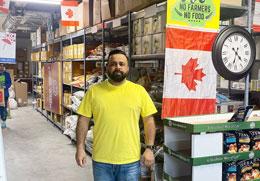International students struggle with COVID, rising food prices

By New Canadian Media
It's 9:00 a.m. on Sunday and Neeraj Walia is readying scores of bags, each loaded with about $150 in groceries for international students.
“Weekends are the busiest and these bags last for about two weeks,” said Walia, the director of the Guru Nanak Food Bank in Surrey, which is seeing a rapid rise in the number of international students in Metro Vancouver seeking help.
“About 1.500 of the 2,200 we see here are international students…. they come from everywhere: India, Pakistan, South America, China and even European countries,” said Walia, whose team of volunteers, powered by donations, are planning to open two more food banks soon.
In addition to the groceries, the Guru Nanak Food Bank is also seeing a rising demand for its bedding program, where international students in need are given a mattress, sheets, and pillows within 30 days of arrival.
“They come prepared to pay tuition fees but have little money for anything else and quickly end up in traumatic situations,” Walia told New Canadian Media.
“There is virtually no government support for these students who have been hit hard by COVID and inflation.”
According to Walia, the Guru Nanak Food Bank in Surrey has also assisted in sending the remains of 10 international students who died in B.C. since July 2020 back to their home countries.
“Now, we are hearing that Toronto funeral homes are reporting at least five international student deaths a week,” said Walia, who has begun a data-collecting process to better define the anecdotal reports.
“Most of the international students who come here plan to become Canadians and the government needs to ensure that a support system is in place for them.”
Walia’s views are reflected in a new study published in the Journal of International Students (JIS), that states COVID-19 is woefully impacting international students in Canada “who are very vulnerable to the pandemic, but excluded from most government financial support programs.”
The study by David Firang from Trent University and Joseph Mensah from York University said excluding international students from government relief programs and supports during the pandemic is unjustifiable and raises concerns about international students’ socio-economic rights violations.
“Most international students experience psychological and financial difficulties amid the pandemic…Due to their temporary legal immigration status, most international students in Canada, who already experience psychological and financial challenges, now experience more difficulties adjusting to, and managing, the current pandemic crisis,” the researchers said.
The study also noted that the situation is triggering a further decline in international students’ admissions, creating economic implications for Canadian universities.
“The COVID-19 pandemic not only creates challenges for international students but also creates economic difficulties for Canadian universities, as a reduction in international student enrollment creates significant tuition revenue shortfall,” it found.
“The economic impact of the COVID-19 pandemic on educational institutions in Ontario, Quebec, and British Columbia could be gravely severe. These popular Canadian study destinations for international students will experience a drastic decline in international students’ recruitment and retention,” the report authors projected.
According to Statistics Canada, international student enrollment fell by nearly 17 percent from 638,960 in 2019 to 530,540 in 2020. Foreign students contributed almost $22 billion to the Canadian economy in 2018 and supported about 170,000 jobs in 2016, according to Global Affairs Canada.
Many of Canada’s international students come from India, with the country representing about 30 percent of all international enrollments in Canada, according to Immigration, Refugees and Citizenship Canada.
Walia of the Guru Nanak Food Bank is now looking at setting up international student orientation programs in key source countries to better equip the students for their new lives in Canada.
“I am originally from Punjab and many of the international students come from there…They are generally from sheltered backgrounds with large families that give them everything they need,” said Walia.
“When they come here to study, they are not prepared for rising costs or COVID or any other crisis that hits them.”
Meanwhile, Colleges and Institutes Canada (CICan) says higher education institutions are ideally poised to help international students to become important contributors to Canada’s economy:
“They serve as a one-stop-shop for skilled newcomers looking to quickly integrate into the labour market and provide critical support, including language training, employment services, and connections to community employers. They also offer specialized academic upgrading programs to international and newcomer students, and a variety of reskilling and upskilling options tailored to their local employment market.”
CICan proposes two ideas to further the likelihood that international students can quickly adjust to life in Canada and enter the labour market:
“First, we must develop a national employment pipeline for skilled newcomers with an emphasis on a national workplace-focused language training programme. This needs to include work-integrated learning opportunities and wraparound support services that prepare new arrivals for life in Canada and facilitate rapid and meaningful labour market integration while accounting for their wellbeing and mental health.
We should also encourage the development of employer-recognized national micro-credentials that focus on in-demand skills. With micro-credentials gaining momentum at colleges and institutes across Canada, we have an opportunity to develop flexible programmes adapted to the needs of newcomers.”









